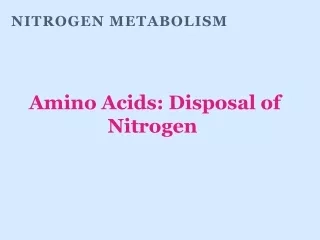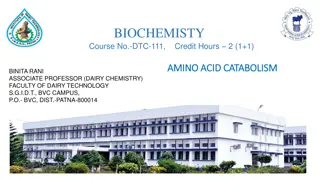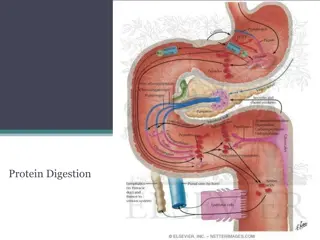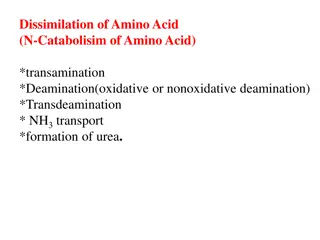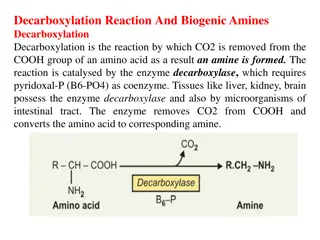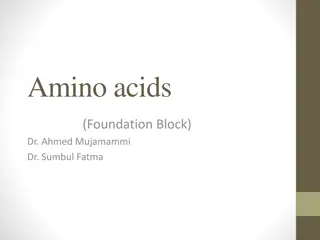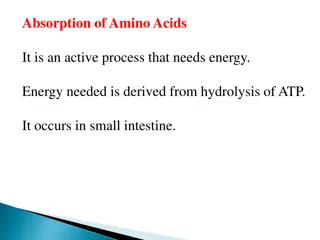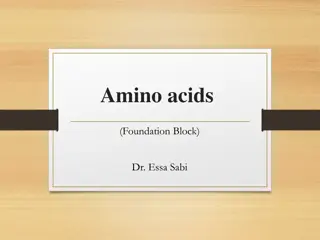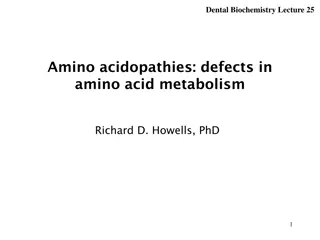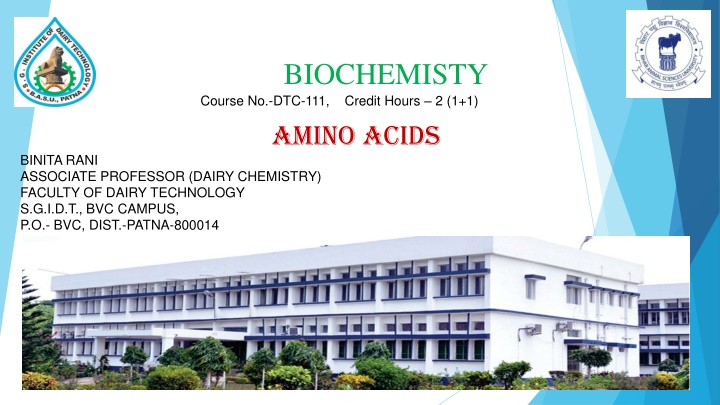
Exploring the Fascinating World of Amino Acids in Biochemistry
Dive into the realm of amino acids with this comprehensive guide covering their structure, classification, and unique properties. Understand the significance of essential amino acids, optical activity, zwitterions, and R-group classifications. Explore the diverse roles of amino acids in protein formation and their crucial importance in various biological processes. Join Associate Professor Binita Rani on an enlightening journey through the study of biochemistry and the fundamental building blocks of life.
Download Presentation

Please find below an Image/Link to download the presentation.
The content on the website is provided AS IS for your information and personal use only. It may not be sold, licensed, or shared on other websites without obtaining consent from the author. If you encounter any issues during the download, it is possible that the publisher has removed the file from their server.
You are allowed to download the files provided on this website for personal or commercial use, subject to the condition that they are used lawfully. All files are the property of their respective owners.
The content on the website is provided AS IS for your information and personal use only. It may not be sold, licensed, or shared on other websites without obtaining consent from the author.
E N D
Presentation Transcript
BIOCHEMISTY Course No.-DTC-111, Credit Hours 2 (1+1) AMINO ACIDS BINITA RANI ASSOCIATE PROFESSOR (DAIRY CHEMISTRY) FACULTY OF DAIRY TECHNOLOGY S.G.I.D.T., BVC CAMPUS, P.O.- BVC, DIST.-PATNA-800014
Amino acid - both amino and carboxyl functional groups. H2NCHRCOOH - Alpha-amino acids carbon - to which the amino and carboxylate groups are attached Amino acids building blocks of proteins classified into essential and non-essential Twenty amino acids eight are essential . adequate consumption of amino acids : during development and maturation pregnancy, lactation, or injury (a burn, for instance). Complete protein source - all the essential amino acids Incomplete protein source - lacks one or more.
Optical Property Protein - Twenty types of amino acids one- or three-letter abbreviations each amino acid representation in peptides. All amino acids have asymmetric carbon optically active, except glycine Amino acids can be dextrorotatory or levorotatory depending upon the rotation of plane polarized light L-amino acids represent majority of amino acids found in proteins. D-amino acids - produced by exotic sea-dwelling organisms L and D convention for amino acid configuration refers to optical activity of the glyceraldehyde isomer from which the amino acid is synthesized rather than the optical property of the acid itself (L-glyceraldehyde is levorotary; D- glyceraldehyde is dextrorotary)
Non superimposable Mirror images of Amino Acids General structure of amino acid
Zwitterions At isoelectric point, protonated ammonium groups and deprotonated carboxylate groups are equal, resulting net neutral charge and formation of Zwitterions Zwitterion can behave as both a base as well as an acid. For glycine, the isoelectric point is arithmetic mean of the two pKa values, because of absence of an ionizable group in its side chain. Glycine has a net negative charge at pH > pI. move towards the anode At pH < pI, glycine has a net positive charge move towards the cathode
Classification of Amino acids As acidic, basic, aliphatic, aromatic, or sulfur-containing based on the R groups properties.

